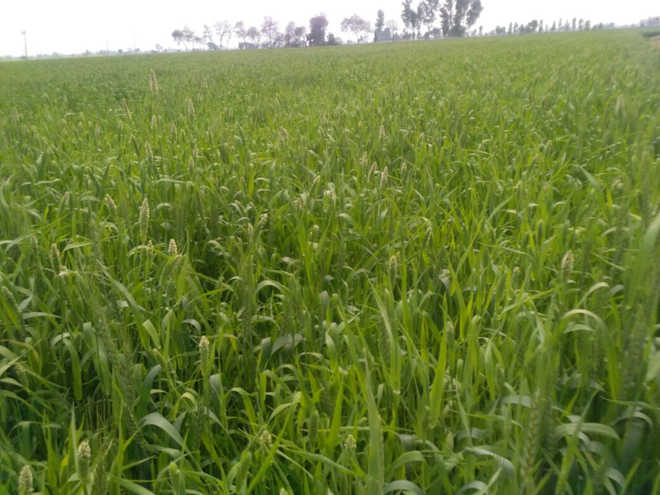Weed threatens wheat yield, herbicides prove ‘ineffective’
Kulwinder Sandhu
Tribune News Service
Moga, March 5
The widespread growth of “phalaris minor” (gulli danda), a wild weed, on wheat fields in the Malwa belt has left the farmers worried. They fear that the weed may lead to decline in crop yield.
Some farmers alleged that the spray of herbicides failed to work effectively to root out the weed, which had put a question mark on its quality.
A couple of years ago, a similar situation was faced by cotton growers during the SAD-BJP government when they could not save their crop from whitefly attack despite the spray of insecticides recommended and sold by the state Agriculture Department.
BKU (Ekta) general secretary Sukhdev Singh Kokri alleged that the farmers had sprayed herbicides recommended by the government to kill “phalaris minor” and other weed, but it had proved ineffective.
Gurwinder Singh, sarpanch of Daata village in Moga district, said farmers were facing a tough time in controlling the weed. The sudden rise in temperature after the recent rain had led to humid weather conditions, which were ideal for the growth of weed.
The farmers have demanded a probe to check the quality of herbicides sold in the market.
Parminder Singh, a farmer of Patto Hira Singh village, has reportedly ploughed the standing wheat crop on 5 acres last week due to the problem of weed.
Dr Jaswinder Singh Brar, a farm scientist of the Agriculture Department, claimed that the herbicides recommended by them were of good quality. The problem was irrational and excess spray due to which weed developed resistance, he claimed. “There is no need for multiple sprays. The farmers must spray it on time as per the expert advice,” he added.
Interestingly, the farmers, who had not burnt paddy straw before the sowing wheat, have not faced the problem and the herbicides sprayed by them have shown good results.
Unlock Exclusive Insights with The Tribune Premium
Take your experience further with Premium access.
Thought-provoking Opinions, Expert Analysis, In-depth Insights and other Member Only Benefits
Already a Member? Sign In Now










